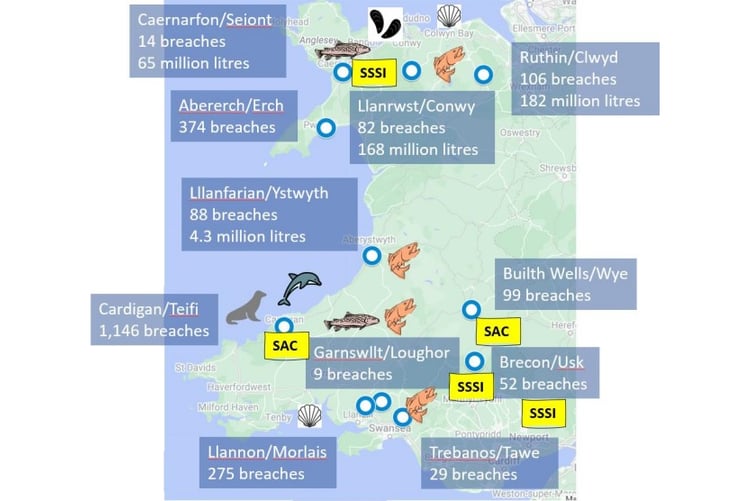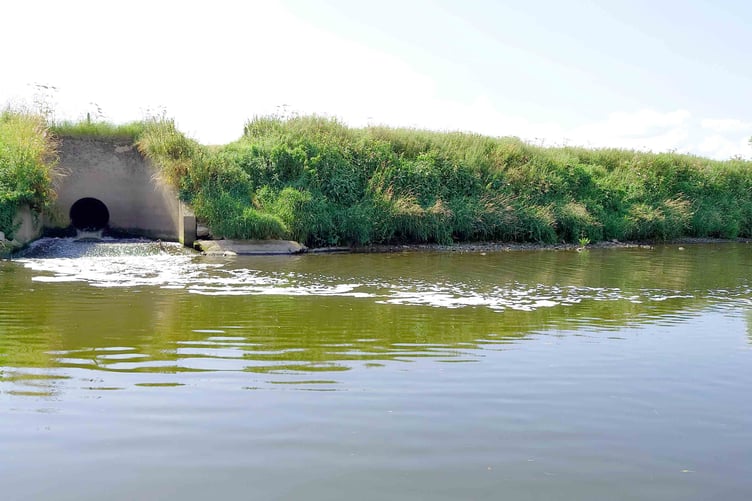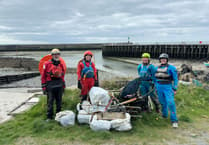Millions of litres of untreated sewage has been pumped into Welsh rivers including the Teifi and Ystwyth, according to new research.
A new report has revealed extensive and long-term failures by Welsh Water to comply with their operational permit conditions.
The report’s author, Professor Peter Hammond, had been advised by Afonydd Cymru to investigate a number of the company’s wastewater works across Wales following concerns over compliance against their discharge permits.
One of the worst performing water works was in Cardigan, which discharged on 1,146 days between January 2018 and 31 May 2023, or on 58 per cent of the days in that five-and-a-half year period. On these days, untreated sewage was allowed to enter the Teifi without the works being at full capacity.
The report also says that 4.3 million litres of untreated water was pumped into the Ystwyth river in Llanfarian, amounting to 88 permit breaches.
Abererch on the Llyn Peninsula saw 374 permit breaches.
The report also says that the long-term breaches at the Cardigan site were known about by Natural Resources Wales (NRW), who allowed the discharges to continue for up to ten years without any significant action.
Only two enforcement notices were served in that time, with no prosecutions of Welsh Water taken by the environmental regulator for the Cardigan site.
Welsh Water last week announced that they would be investing £20 million on an entirely new wastewater site in Cardigan.

Afonydd Cymru warned: “While this should prevent any further increases in environmental harm, the problems with the current Cardigan works remain and it is likely that the historical impact of a site that was allowed to fail for so long is significant.
“While there is clear evidence that Welsh Water tried to resolve the problems at Cardigan, Natural Resources Wales did not adequately address these failures (and possibly others elsewhere) with its light-touch approach to over nearly a decade of environmental harm from the site.”
Reacting to the report, Jane Dodds, MS for Mid and West Wales, said: "We have the second highest bills across the whole of England and Wales, company bosses have been awarded thousands in bonuses and at the same time have been illegally dumping sewage into our rivers.
"I have repeatedly led calls in the Senedd for tougher action on sewage dumping and for a full review of Dŵr Cymru and it's operation. The Welsh Labour Government must take those calls seriously or risk the future of our rivers."
Reacting to the criticism of the Cardigan works, Dŵr Cymru said: “We had already identified the issue there being linked to salt-water entering the works which impacts the treatment process. We reported this to NRW and agreed to undertake investment to improve the situation. Whilst this initial upgrade made some improvement, we are investing a further £20m at the site in 2025 to ensure full compliance with the discharge permit. Our discovery of issues at Cardigan have been fully disclosed to NRW from the earliest opportunity in line with our usual approach to dealing with these issues.”
Ann Weedy, Operations Manager at Natural Resources Wales said: “We are aware of significant compliance issues at the Cardigan wastewater treatment works, and we have used our regulatory powers to enforce the improvements required at the site over the years.
“The issue is now unresolvable without significant investment and upgrading of infrastructure by Dŵr Cymru Welsh Water.
“But this is the kind of investment that we, and the public expects. The enforcement action we are taking at this site requires Dŵr Cymru Welsh Water to commit to this programme of work during their next investment period and we will work with them to drive the improvements at this site that we all want to see.
“We are currently investigating the severity and frequencies of the permit breaches at the site and this investigation is ongoing. Any breaches will be dealt with in line with our Enforcement and Sanctions Policy.
“Both regulators, Ofwat and NRW, have been clear that the current use of storm overflow discharges is unacceptable and needs to change. We understand the concern of many across Wales that overflows are operating too frequently, and we are taking steps to ensure our regulation of overflows responds to the needs of the environment and public.
“We continue to challenge water companies to improve their performance across all assets, to ensure overflows are properly controlled. Part of this work includes the tightening of our regulation and through our work on the Wales Better River Quality Taskforce. We are also overseeing a programme of investment of £20m by the water companies to further reduce the impact of storm overflows, prioritising high spillers.”





Comments
This article has no comments yet. Be the first to leave a comment.